ADVERTISEMENT
Scurvy, caused by vitamin C deficiency, has an interesting history. James Lind discovered in 1747 that only oranges and lemons could treat scurvy, a common problem among sailors. Animals can synthesize vitamin C, but Axel Holst and Theodor Frölich produced scurvy in guinea pigs. Vitamin C was identified by Charles Glen King in 1932, and Norman Haworth deduced its chemical structure in 1933 (Carpenter, 2012).
Vitamin C: Its importance, functions, and how much you need.
Vitamin C is a water-soluble vitamin that humans can’t synthesize (unlike most animals). It is essential for enzymatic reactions, collagen production, and gene expression regulation (Naidu, 2003). It is also a potent antioxidant (Buettner, 1993). Studies show that higher vitamin C status may lower the risks of hypertension, coronary heart disease, and stroke (Morelli et al., 2020). Vitamin C supplements are well-documented to help shorten the duration of the common cold but do not reduce the risk of becoming ill (Rondanelli et al., 2018). No scientific evidence suggests that large amounts of vitamin C in adults have adverse or toxic effects. Due to its osmotic effect, unabsorbed vitamin C in the gastrointestinal tract can lead to diarrhea, nausea, abdominal cramps, and other gastrointestinal disturbances (Jacob & Sotoudeh, 2002a). The recommended dietary allowance (RDA) for adults aged 19 and above is 90mg daily for men and 75mg for women. However, during pregnancy and lactation periods, the vitamin C requirement increases to 85mg and 120mg per day, respectively. Therefore, a balanced diet is essential, including foods rich in vitamin C, such as citrus fruits, kiwi, strawberries, broccoli, and tomatoes, to meet these daily requirements and maintain good health (Levine et al., 2001).
Recommended Daily Allowance (RDA) for Vitamin C

9 Signs of vitamin C deficiency
1. Dry, Damaged Skin
Healthy skin contains a sizable amount of vitamin C, which helps to maintain it by shielding it from oxidative damage caused by the sun and exposure to harmful pollutants like environmental toxins (Pullar et al., 2017) (Podda et al., 1998). It also encourages the production of collagen, which keeps the skin youthful-looking (Duarte et al., 2009). Studies show that individuals with high vitamin C intake generally have better skin quality, while those with lower intake have a 10% increased risk of developing dry, wrinkled skin (Iizaka et al., 2016). However, it’s important to note that vitamin C deficiency is one of the various factors that can cause dry and damaged skin (Cosgrove et al., 2007).
Continued on next page
ADVERTISEMENT
